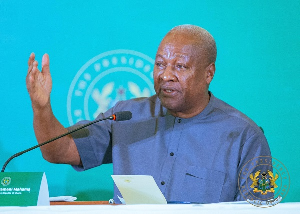Janga (N/R), Oct 27, GNA - Mr. Sulley Abudu Zakaria Lord, West Mamprusi District Chief Executive (DCE), has said females have suffered the consequences of several unfavourable gender policies.
These have affected their progress, he said, and called for those policies to be reviewed to ensure sustainable national development. Mr. Zakaria was speaking at a community forum on Reproductive Health and Domestic Violence at Janga in the West Mamprusi District, organised by the Department of Women and Children's Affairs. He suggested for the closing of the gender disparity gaps through rigorous education that would empower women to utilise economic opportunities to create wealth for them to improve their livelihoods.
The United Nations Population Fund (UNFPA) sponsored the forum under the theme: "Respect Women's Reproductive Health; Stop Gender Based Violence."
Mr. Zakaria said to bridge the gap between females and males, women need to actively participate in decision making processes at all levels. They should be educated on sexual and reproductive health issues to enable them to make reproductive choices.
"Women need to be respected, loved, protected and given equal opportunities as their male counterparts," he said. Mr. Zakaria noted that women in Ghana, especially those in the Northern Region, suffer a lot of developmental setbacks largely as a result of gross abuse of their basic rights in spite of the many local and international legislations the country has ratified.
"So far Ghana has agreed to legislations, including the International Covenant on Economic, Social, Cultural, Civil and Political Rights, the African Charter on Human and People's Right, as well as the Convention on the Elimination of all forms of Discrimination Against Women, which the nation must implement," he said.
The DCE said a survey on Girl Child Education conducted at Tolon in the Kumbungu District of the Northern Region, by Association of Church Development Projects and Maata-N-Tudu, in 2006, indicated that the Kpalguu Senior High School did not have a single girl enrolled. He explained that the girls in the area had migrated to the cities, especially to Accra, to become potters, popularly referred to as "kayaye".
Mr. Zakaria said efforts by the district to combat violence were often regarded as interference in the 'private' matters of people. Additionally, strong cultural taboos and beliefs also prohibit these efforts.
Assistant Superintendent of Police (ASP) Stephen Tetteh, Northern Regional Coordinator of the Domestic Violence Support Unit, (DOVSU) said some people do not appreciate the Domestic Violence Act because majority of married women still suffer gender-based violence. "Gender based violence has become a matter of global concern, especially for women, since they are the hardest hit by gender violence," he said, and called for concerted efforts to address them. ASP Tetteh urged women and girls to be very vigilant and stand firm for their rights, adding that, they should be bold to report abuses to DOVSU.
Ms Miriam R. Iddrisu, Gender Officer of UNFPA, said the cost of domestic violence to women, their children, families and the communities was a significant obstacle to the nation's quest to reducing poverty, achieving gender equity and attaining the Millennium Development Goals.












